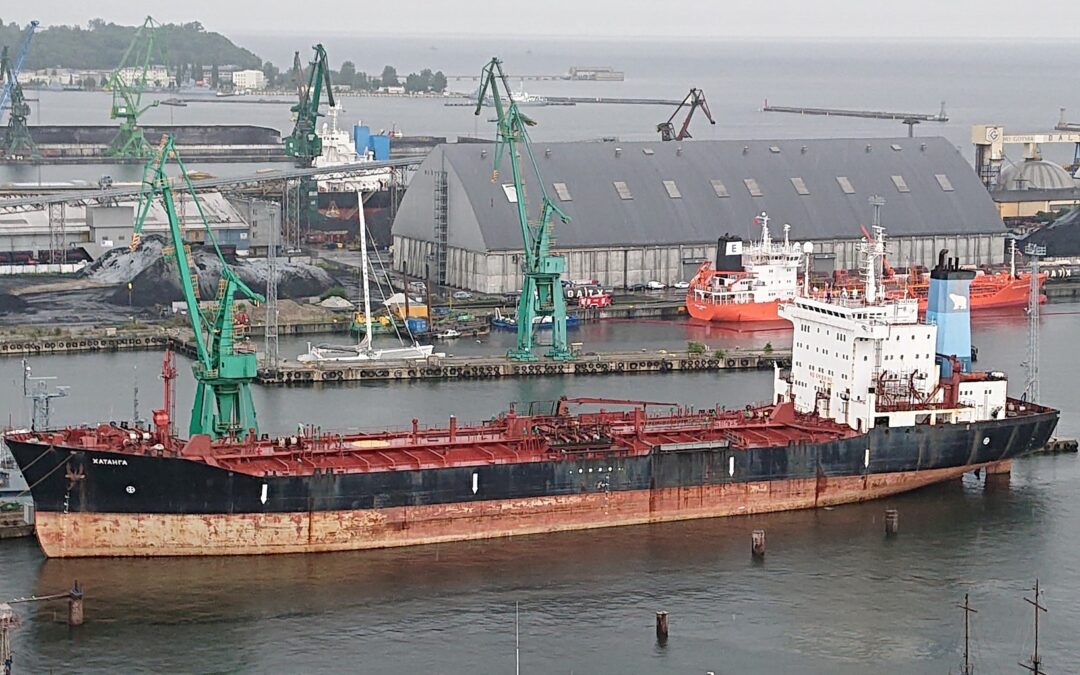Keep our news free from ads and paywalls by making a donation to support our work!

Notes from Poland is run by a small editorial team and is published by an independent, non-profit foundation that is funded through donations from our readers. We cannot do what we do without your support.
A Russian ship that has been sitting in a Polish port for almost eight years will now be removed, the Polish government has confirmed.
Poland will also seek compensation for the costs involved and for the entire period of the ship’s time in the Baltic Sea port of Gdynia. However, the ship’s Russian owner went bankrupt and folded in 2020.
“We are removing Russian scrap from our port,” deputy infrastructure minister Arkadiusz Marchewka wrote on his social media after his ministry had announced the removal of the oil tanker, called Khatanga (pictured above in Gdynia in 2020).
Usuwamy rosyjski złom z naszego portu.
Państwo działa i zapewnia bezpieczeństwo polskiej infrastruktury. https://t.co/7axknWpcxO
— Arkadiusz Marchewka (@A_Marchewka) February 6, 2025
Khatanga initially entered the port in 2017 seeking repair but has since been abandoned. In 2020, Murmansk Shipping Company – the Russian owner of Khatanga – went bankrupt and, soon after, the management of the port of Gdynia lost contact with the insolvency administrator.
Last year, Jacek Kaszuba, head of the port authority in Gdynia, told broadcaster TVN that technically the ship was not abandoned because it still has a representative.
That meant that, “from a legal point of view, we have no possibility of doing anything with it without consulting Murmansk Shipping Company, or rather the bankruptcy trustee”, he added.
However, according to the Polish infrastructure ministry, the director of the Maritime Office in Gdynia has now issued a decision obliging the port authorities to remove the Russian vessel “immediately, but no later than three months” from now.
The ministry says the vessel “poses a threat to the safety of navigation”. Mirosław Czapiewski, a vice-president of the port authority, told broadcaster Kanał Plus that in recent months the ship’s moorings loosened during rough weather and it had to be secured by a tugboat.
According to the Polish Press Agency (PAP), the Maritime Authority in Gdynia has also previously raised concerns about the security of the vessel, which it believes can potentially pose chemical and intelligence threats.
Gdynia is home to a logistics base of the Polish navy as well as the Baltic Container Terminal, where the handling of NATO equipment takes place.
Gdańsk in Poland has become the EU’s fifth-busiest port, overtaking Algeciras in Spain and HAROPA in France, the latest @EU_Eurostat data show.
Meanwhile, national data show that Poland’s ports reported record financial and operational results in 2024 https://t.co/q4QFf8df2G
— Notes from Poland 🇵🇱 (@notesfrompoland) January 15, 2025
“Additionally, the port authority will demand reimbursement of costs from the Russian shipowner for the entire period of the vessel’s mooring in the port,” wrote the ministry.
A spokeswoman for the port, Kalina Gierblińska, told Kanał Zero that the compensation could amount to around 13 million zloty (€3.1 million).
In separate comments to news website Trojmiasto she said that the port had “for months” been trying to obtain a decision allowing them to remove the ship.

Notes from Poland is run by a small editorial team and published by an independent, non-profit foundation that is funded through donations from our readers. We cannot do what we do without your support.
Main image credit: Braveheart/Wikimedia Commons (under CC BY-SA 4.0)

Agata Pyka is a former assistant editor at Notes from Poland. She specialises in Central and Eastern European affairs, cybersecurity, and investigative reporting. She holds a master’s degree in political communication from the University of Amsterdam, and her work has appeared in Euractiv, the Balkan Investigative Reporting Network (BIRN), and The European Correspondent, among others.



















